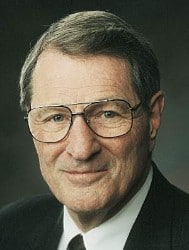
“True faith is not to be brought about by overwhelming and intimidating intervention from God”
| “Not My Will, But Thine.” Salt Lake City: Bookcraft, 1988.
Quotes By Elder Neal A. Maxwell
Elder Neal A. Maxwell served as a member of the Quorum of the Twelve Apostles from 1981–2004. Among others, Elder Maxwell’s most prominent books are All These Things Shall Give Thee Experience, Not My Will, but Thine and the Neal A. Maxwell Quote Book. Maxwell was known for his great mind and ability to articulate his thoughts elegantly.

“True faith is not to be brought about by overwhelming and intimidating intervention from God”
| “Not My Will, But Thine.” Salt Lake City: Bookcraft, 1988.

“We live and teach amid a wide variety of individual personalities, experiences, cultures, languages, interests, and needs. Only the Spirit can compensate fully for such differences.”
| That Ye May Believe (Salt Lake City: Bookcraft, 1992), 39.

“You and I cannot really expect to glide through life . . . naively petitioning, ‘Lord, give me experience but not grief, a deeper appreciation of happiness but not deeper sorrow, joy in comfort but not in pain, more capacity to overcome but not more opposition; and please do not let me ever feel perplexed while on thy errand. Then let me come quickly and dwell with thee and fully share thy joy.”

“Daily hope is vital, since the ‘Winter Quarters’ of our lives are not immediately adjacent to our promised land either. An arduous trek still awaits, but hope spurs weary disciples on.”
| "Brightness of Hope," Ensign, Nov. 1994, 36

“Those who ‘live without God in the world’ anxiously glean their few and fleeting satisfactions, but they are unable to find real happiness….”Ignorant of the plan of salvation, many simply do not know what the journey of life is all about. Therefore, modern selfishness and skepticism brush aside the significance of the Savior…”
| Ensign, March 1998

“Though of themselves life’s defining moments may seem minor, our wise responses can gradually increase our traction on the demanding path of discipleship. For instance, we can decide daily, or in an instant, in seemingly little things, whether we respond with a smile instead of a scowl, or whether we give warm praise instead of exhibiting icy indifference. Each response matters in its small moment. After all, moments are the molecules that make up eternity, affecting not only ourselves but others, because our conduct even in seemingly small things can be contagious.”
| The Promise of Discipleship, pg. 71

“Real hope is much more than wishful musing. Hope is realistic anticipation taking the form of determination – a determination not merely to survive but to “endure . . . well” to the end. In the geometry of restored theology, hope has a greater circumference than faith. If faith increases, the perimeter of hope stretches correspondingly. Hope keeps us “anxiously engaged” in good causes even when these appear to be losing causes. Those with true hope often see their personal circumstances shaken, like kaleidoscopes, again and again. Yet with the “eye of faith,” they still see divine pattern and purpose. Whatever our particular furrow, we are to “plow in hope,” without looking back or letting yesterday hold tomorrow hostage.”
| Ensign, November 1994

“Our faith in God must be strong, therefore, not only in behalf of ourselves and our own trials, but also upon seeing those human conditions involving human wickedness which are truly wrenching but which are permitted by God because of God-given but morally misused agency.”

“Alas, in our age, some arrogantly believe that if they cannot comprehend something, then God cannot comprehend it either.”

“Whether young or old, we need to be good friends, but also to pick our friends carefully. By choosing the Lord first, choosing one’s friends becomes easier and much safer. Consider the contrasting friendships in the city of Enoch compared to peers in the cities of Sodom and Gomorrah! The citizens of the city of Enoch chose Jesus and a way of life, then became everlasting friends. So much depends on whom and what we seek first.”